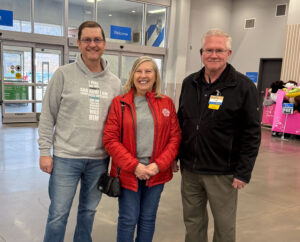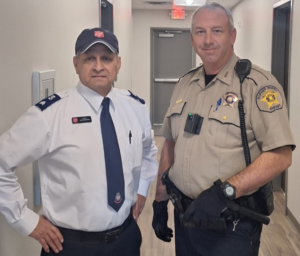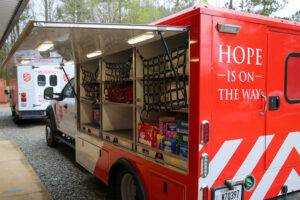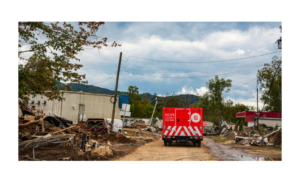Reprinted from the October 15, 2005 edition of “The War Cry” – Original author unknown
Just months before Hurricane Katrina hit the Gulf Coast, Joy Sellers had gone back to full-time duties as a caseworker for The Salvation Army’s Lawrenceville, GA corps. At first, about 20 people showed u at the corps looking for respite after their flight from the wreckage in Louisiana. Over the next weeks, Sellers and the corps’ staff worked around the clock to assist more than 12,000 evacuees arriving in Atlanta from the devastated areas.
Even as they welcomed people who had witnessed unimaginable loss and tragedy, often within their own families, they saw how uplifting the experience has been for the greater Atlanta community. Volunteers streamed in to offer assistance and have new respect for how the Army treats people with respect. They also gained new appreciation for ways to serve their community through Salvation Army programs.
The following excerpts are taken from Sellers own electronic diary she shared with friends and family about the outpouring of love and support people are offering to thousands left bereft by the storm.
Tues, Aug 30:
It’s ironic. I just attending a meeting at the medial center to find out about opening a shelter in Gwinnett County. Our county has a great need for shelter, but little did I know the need to provide for numerous people and families in our area would reach an extreme new dimension on this day.
It’s been about 20 minutes since I got back, and the first evacuees from New Orleans have arrived at our building. It’s an extended family, 20 people. They lost their home and all their belongings. We were able to house them at an extended-stay hotel for a week. They are so grateful.
3 p.m.
We just got word that our little corps has been declared the Hurricane Disaster Center for the city of Atlanta. That’s a big job for our small staff, but we put together a team to assist the evacuees; I took charge of casework. Now I’m training whole rooms full of people as caseworkers, giving them a 10-minute crash course on how to help all the devastated, displaced people who are streaming through our doors.
Thurs, Sept 1
The disaster team has taken over the building. We’re sorting through donations of food, clothing, and personal items. We have one room that’s filled almost floor to ceiling with diapers. Basically, everything we could think of has started pouring in from the community. As the donations come in the back door, we’re distributing them out the front door to the victims. Gifts of money are coming in too. One man just showed up at our corps building and handed us a check for $10,000.
Our full-size gym is loaded now with volunteers going through cans and boxes of food. Walmart gave us shopping carts, which we are using for our make-shift grocery store in the corps gym. We’ve also come up with a system where evacuees come in and we give them food and vouchers for Walmart and Army’s thrift stores.
In the days after the disaster: The volunteerism we’re seeing is amazing. One girl named Shirsten has been here all day, every day. She even invented a training class to get new volunteers up to speed. We’ve seen men who have put aside their work for a week just to help out; entire churches showed up to lend a hand.
My husband, Cecil, has volunteered for seven days straight. He put together a numbering system to help the victims find what they need faster. He has posted signs everywhere.
Actually talking to the victims of Hurricane Katrina has been surreal. You see their stories on the news, but to look directly in their eyes is sobering. The first few days of this relief effort, I met with one evacuee after another. I couldn’t sleep at night. The pressure of it all just about killed me. Then, when I was put in charge of just managing the other caseworkers, things got better.
One week after the hurricane
I’ve learned that anyone with two changes of clothes is lucky. Most of the evacuees lost their homes entirely. I’ve seen a two-week-old baby with no formula, an elderly person who was pulled out of a nursing home in a wheelchair, a diabetic who had on insulin and lost his prosthetic leg, a child crying over losing her pets, a young boy who watched his father drown and wouldn’t talk and a girl who had witnessed a murder and family suicide at the Superdome. One young man came into our building having panic attacks. He couldn’t breathe and was unable to stand. We called 911 and took him and his family back to one of our Sunday school rooms where there was a futon he could lie down on. His sisters told us they had lost both their parents this year, one in March and the other in April. They had lost their home in New Orleans and were lucky to have a few changes of clothing. The entire family was crying. Our efforts to comfort them seemed in vain due to the strong emotional distress they were under. Our bandmaster prayed with them until the ambulance arrived. We then loaded them up with bags of snacks and and other food items. We don’t know what happened to them after that.
Overall, I’ve been amazed at how many victims have seemed so calm and in control. We’ve had professional counselors and pastors coming in to volunteer. They’ve been praying with the evacuees. We only had one incident where a few people got angry. Other than that, everyone has been grateful and thankful.
Two weeks after the disaster
I think “Phase Two” of this relief effort will begin next week. We want to help the family members who are housing the survivors to pay their bills. The next major problem after that will be housing and jobs, but I don’t think we’ll be back to normal for a long time.
More than anything, I feel privileged to have been part of this. It’s been a life-changing experience. I’ve been a part of history that will be written down in our children’s textbooks. Seeing The Salvation Army in the light of disaster work has made me very proud to be a part of this great organization.
In the three weeks after Hurricane Katrina, the Lawrenceville, GA corps served more than 16,000 Gulf Coast residents. Joy Sellers says the corps and the community in Lawrenceville will never be the same, but she adds there has been one positive effect that’s come from the storm: a growing awareness of what The Salvation Army is and does.











